- Home
- Antonia Fraser
Oxford Blood Page 14
Oxford Blood Read online
Page 14
Saffron was dressed in white cotton trousers, rather tattered, and ending as though more by chance than design at the knee, and a scarlet vest. He was browner than Jemima remembered and, she had to admit looked remarkably handsome. He also had an air of health. It was difficult to believe that he had so recently been in hospital; in fact with his tanned skin, thick black hair, considerably longer, flopping over his face, and his slanting black eyes, he looked more like a gipsy than ever; a stage gipsy from a musical comedy perhaps.
Tiggie on the other hand, in baggy khaki shorts and a mud-coloured shirt, looked for the first time drab, not a word which Jemima would ever have thought to apply to her in London. Compared to Saffron, she had the air of a hen bird: she had had her hair cut very short and her skin remained pale. The only sparkling thing about Tiggie on this occasion was the conspicuous ring on her finger. Diamonds, yes, and emeralds, or rather one great big emerald. This ring really did gleam and was either brand new or had been recently cleaned. But the nails on the small pale hand which bore the weighty ring were dirty. Jemima was surprised; she had the impression that the fairy creature she had first encountered at Megalith had been immaculately clean beneath her bizarre get-up.
Saffron gave his mother a light peck on her papery cheek; then he gave Jemima a kiss on both cheeks, followed by a hug. He was hot and sweaty like a young horse which had just run a successful race.
'Tennis, darling?' enquired Lady St Ives, with a doting look, as though to explain this condition and at the same time boast of it.
'Fanny and I have just beaten Jack and Cousin Andrew.'
'Andrew must have hated that!' pronounced Lord St Ives with much satisfaction. 'He used to be frightfully good. Didn't he play in doubles at Wimbledon, my dear?' Lady St Ives looked rather vague as if the subject of anyone else's tennis other than that of her son's did not interest her.
'I don't think Jack liked it very much either,' said Saffron. 'He always used to beat me. But Fanny's terrific. Serving like Martina Navrati-what-not. Tremendous at net too.'
'Oh darling, do you think you should - your head—'
'Oh Ma!'
'What about you, Antigone?' Lord St Ives asked kindly. Jemima noticed he exhibited the same courtesy to the young as to the old, and was especially gallant to his future daughter-in-law.
Saffron answered for her. 'Tiggie doesn't play.' Tiggie cast down her eyes, so that the long lashes which Cass had admired fluttered on her pale cheeks. 'I hate games,' she said in a voice which was scarcely above a whisper.
Saffron took her hand and held it. The pair of them were standing directly beneath The Strawberry Children - subtitled: The Honble Miss Iverstone and her brother with a basket of fruit. Then he dropped the hand and turned to Jemima.
'Well, I love games. There's going to be a return match. Come and watch. Cheer me on. You're on my side, you know you are.' Saffron's bold black eyes challenged Jemima: there was something febrile about him today, as new and marked as Tiggie's passivity. It was a sexual statement.
'My dear boy, I'm certainly on your side.' Lord St Ives put his arm around his son's shoulders. Jemima wondered if he had perhaps known what Saffron was up to, and decided that he probably had: not much passed by Lord St Ives. Seeing them side by side for the first time, 'father' and 'son', she was struck by the similarity of their stance; Saffron had evidently copied his father's bearing, even some of his mannerisms, from childhood. Although physically they could hardly have been less alike, the one so dark, the other so typically English, Jemima ruminated on the interesting resemblances which 'nurture' not 'nature' was able to bring about. She had known other adopted children, come to think of it, who had grown to resemble their 'parents' so strongly, that people sometimes refused to believe in the truth of their adoption.
'You're avenging all the times Andrew used to beat me,' said Lord St Ives.
'Quite apart from Jack beating me,' replied Saffron. 'All the cousins are terrifically athletic; or anyway they try very hard. To make up.' Saffron sounded quite complacent.
'To make up for what?' Jemima asked innocently, although she knew the answer; but she felt an urge to prick the complacency, a radical urge which she instantly regretted when Lord St Ives, who had not held Russians in play for nothing, picked up cudgels. Or rather, he appeared to gaze at the cudgels beneath his nose and find them instantly delightful.
'Why, to make up for being dreadfully poor of course, whereas we are dreadfully rich!' he exclaimed, with his usual zest. 'It is unfair. Don't you think so, Miss Shore? Of course you do. That we should have all this—' he gave a wide gesture embracing not only the Reynolds, the Lawrence, and several thousand books in their majestic bindings, but also Binyon who had at that moment entered and was standing, still clad in his eponymous T-shirt, at the door. 'I expect you want me to feel guilty. Oh Miss Shore, I do, I do.'
'Ivo, why are you being so silly?' Lady St Ives suddenly enquired. 'You know you don't feel guilty at all. The hereditary system is absolutely indefensible, except that it happens to work brilliantly. I've heard you say it countless times.'
'Oh my dear, don't give me away,' said Lord St Ives tenderly. 'I only say that in the House of Lords; you've been listening to my speeches which I really don't advise. Nobody listens to my speeches in the House of Lords.'
Lady St Ives continued to look gently reproachful.
'Besides, I think Miss Shore is referring to primogeniture, aren't you, Miss Shore? Why should I sit in glory here at Saffron Ivy while for example poor Cousin Andrew pigs it in Henley?'
'I did ask a question,' said Jemima sweetly. 'But I don't think it was exactly that one.'
'But Ivo, Daphne and Andrew don't live in Henley, no one lives in Henley—' began Lady St Ives.
'Facon de parler, my dear, facon de parler. I have to admit that one good defence of the hereditary system does seem to me the fact that I live here and Cousin Andrew doesn't. But then I'm prejudiced. Now what about that tennis?'
'The players are on the court, my lord.' It was the solemn voice of Binyon, once again sounding, if not looking, like the butler of Jemima's dreams. 'Mr Valliera is playing with Miss Fanny in place of Lord Saffron.'
'No he bloody isn't!' exclaimed Saffron. And so they all went and watched the tennis, leaving Jemima with various images in her mind, some of them concerning Saffron, some Tiggie, some both; and some thoughts about Lord St Ives and the hereditary system. She did not think that Lord St Ives had been altogether joking when he defended his inheritance on the grounds that he was worthy of it, whereas his cousin was not. That substitution all those years ago ... she had expected to find it quite implausible in the face of Lord St Ives' famous courtesy and 'parfait' manners, in the words of Jack. But Jack was right: there was something quite steely there underneath it all.
The last thing she had learned concerned the passionate affection which was borne towards Saffron by his parents - not only Lady St Ives, but Lord St Ives as well. There was something quite naked about the devotion he had momentarily exhibited when he put his arm around Saffron's shoulders. Jemima dreaded to think what would happen to this elderly couple if anything happened to him. And this time she was not pondering on the fate of the Iverstone inheritance.
14
Tennis is About Winning
It came as relief after these subterranean fears, to watch the open rivalries of the tennis court. When the St Ives party arrived, Proffy and Eugenia Jones were sitting in two ancient deck chairs beside it. Their heads were close together.
Jemima had the impression that some rather earnest colloquy had been interrupted, certainly not of an amorous nature and probably not connected with the tennis match either. Both stood up as Lady St Ives, walking with difficulty, arrived. Eugenia Jones looked extraordinarily melancholy and, unlike Lady St Ives, in no way conveyed that kind of indulgent affection towards Tiggie which might have been expected on such a celebratory occasion. More than ever she seemed dependent on the ebullience of Proffy who gave the air of cosse
ting her, as a bear might protect some smaller breed of animal. This kind of possessiveness in public away from home was no doubt intended to make up for his defection to the side of Eleanor in marriage.
On this occasion Eugenia simply ignored Tiggie and walked in the direction of St Ives as though to speak to him. In a neat manoeuvre, Proffy somehow managed to outflank her:
'A word—' he began.
'Later, later. After tennis. I know words. They lengthen into sentences. To say nothing of speeches. Then we shan't get any tennis.'
'Oh Ivo, are you going to play?' cried Lady St Ives.
'If anyone will play with an old man like me,' replied Lord St Ives genially. 'A geriatric doubles, perhaps, after this dashing match is over.' He settled himself down, as though the matter was decided. Jemima was nonetheless left with the impression that the tension within Eugenia which Proffy had in some way tried to relieve, had not subsided.
The tennis court itself, Jemima was amused to note, was more in the tradition of Lady St Ives' jewellery, antique splendour now much dimmed, than of anything more professional. Andrew Iverstone did indeed allow himself some fairly barbed references to the superiority of the court in - or rather near - Henley. Lord St Ives bore it all with great humour as he sat in a deck chair, itself not in its first youth, his face shaded by an aged straw hat, whose faded ribbon doubtless proclaimed membership of some exclusive club to which Andrew Iverstone had never belonged.
'Can't you get your people to look at this court, Ivo?' shouted Andrew Iverstone eventually, when he failed to return a modest lob from Saffron which landed in one of the more obvious craters.
'What people, my dear chap? I don't have any tennis people, I fear. This court was made before the war. En-Tout-Cas.' He gave the name exquisite French pronunciation. 'I must say it's lived up to the name. Until today that is.'
'I'll give you the name of ours,' grunted Iverstone, smashing a good low forehand drive from his daughter unexpectedly to Saffron's backhand and thus winning the point.
'Such charming people' fluted Daphne Iverstone in the vague direction of Gwendolen St Ives. 'Old-fashioned manners which I think make such a difference—'
'Be quiet, will you, Daphne, when we're playing.' Andrew Iverstone's politeness, in its own way as much a part of his public character as that of Lord St Ives, evidently did not stretch as far as the tennis court. Some of the other young sprawled temporarily by the court. They included Bernardo Valliera who proved to own both the Harley Davidson and the Porsche (how had he transported both to Saffron Ivy?). The dusty Cortina however did not belong to Jack who said cheerfully he could not afford a car, but to Proffy. The smart little Mini was a recent present from Saffron to Tiggie. Then the young departed for the croquet lawn which lay at some distance, sufficiently far for the gales of laughter which punctuated play to have a charming rather than irritating effect upon the ear.
Iverstone was at net where he made an imposing bull-like figure, his great red forehead gleaming with sweat; there was no doubt that he was still a formidable tennis player, and Jemima could well imagine that he had once been in the top class. In spite of his weight - in any case much of it still gave the impression of being muscle - he looked fit enough. Jack looked quite puny beside him and was, as he wryly admitted, still regularly beaten by his father on that immaculate Henley court.
'Since Daddy is a master of the chop shot, the slice, the top spin and all other similar ploys.'
'Tennis is about winning, my dear boy' was Andrew Iverstone's comment on this. All the same, Jack was a good player, with style and ease.
Jemima glanced at the spectators. It was odd how Eugenia Jones kept her glance quite rigidly fixed on Andrew Iverstone and to a lesser extent lack, her tension if anything increased. She remained silent throughout. Proffy on the other hand took an active interest in the game, shouted encouraging comments, applauded, and generally revealed himself in the rather unlikely role of a tennis buff. Although his ceaseless chatter might have put off some players, it was in a way preferable to Eugenia Jones' unhappy silence. Jemima turned back to the court itself.
The wonder was that Saffron and Fanny had taken the first set; perhaps knowledge of local conditions, in the form of the court's bad patches, had helped them, Jemima reflected wryly. If Saffron in his tight white breeches and red vest looked like a stage gipsy, he played tennis more like a stage bullfighter in the sense that his tennis had the air of being conducted largely for the benefit of the spectators. There were frequent smashes, many of which landed against the rusty old netting at the end of the court, rather than anywhere more conventional within the white lines.
At any rate Andrew Iverstone and Jack took the second set quite easily, six-one. Although Jemima could not help noticing that Iverstone took advantage of every doubtful ball to call the score in his own favour, without any interference from Jack: it was so characteristic of the man. Even when the Iverstones were leading four-love against Saffron and Fanny, Andrew Iverstone insisted that a particular ball of his daughter's had been out although Jemima could have sworn that there was a tiny puff of chalk from the bedraggled court. Jack did nothing. After all, what was there for him to do? Only Saffron, with a deliberate swagger, carefully dropped the next few balls which came his way just over the net.
'Just to make sure, Cousin Andrew.' It was in fact this method which secured Saffron and Fanny their solitary game, since it defeated both Iverstone at the back of the court and Jack who waited for his father to take them.
None of this seemed to make much impact upon Tiggie, sitting on the grass at the side of the court and wearing a large flowered cotton sun bonnet - where had she found it? - which accorded oddly with the rest of her khaki outfit. She was totally docile, to the extent that Jemima wondered if she was actually aware of the play in progress.
The third and decisive set began. It did not seem likely that Saffron and Fanny would find their original form again. Tiggie's head in its large bonnet drooped. But it so happened that Saffron and Fanny, having gone a long way down at the start of the set, with Andrew Iverstone (and to a lesser extent Jack) grimly determined to pulverize every ball, now began to pull back.
This was partly due to Fanny's steady strong play: Saffron's comparison to Martina Navratilova was perhaps going a little far, but there was certainly something of the same determined masculine style about Fanny's tennis. Jemima discerned for the first time a distinct resemblance to her father in the stance of the well-muscled but shapely legs, for example, which were not particularly long but twinkled across the court at an astonishing pace to bat balls down the tramlines beyond her father's reach.
Saffron's smashes were also beginning to find their mark just inside the court instead of a yard outside it; and similarly his first service actually produced some aces, as well as the usual ration of ineffectively hard shots which left the aged net shaking as they slammed into it.
The score in games was now five-four to Saffron and Fanny, Saffron having just held his service with a triumphant last ace. Now Andrew Iverstone himself was serving, with Jack a slightly deferential figure at net. Jack's air of deference was in part due to the fact that his father's service had become just slightly erratic with age: although Iverstone was still capable of delivering balls with an amount of top-spin which made them highly challenging to return, he was equally capable of an apparently inexplicable double fault. In such a case, Iverstone's temper, like his service, could be erratic.
Now a series of these double faults from Iverstone had brought the score to deuce. Then Fanny in the right-hand court passed Jack at net with one of her well-placed drives. Andrew Iverstone glanced briefly and very angrily at the ball: for one moment Jemima thought he might actually call it out - although the ball was in by inches. Instead he said nothing. It was left to Saffron to sing out the score:
'Advantage Lord Saffron and Miss Iverstone, that popular young couple. Set point. Don't feel nervous.' Jemima thought it singularly tactless of him. After all, everybody
realized it was set point. Nobody else commented. Saffron, still very much at his ease, crouched slightly to receive Andrew Iverstone's service.
It was at this very moment that Tiggie, for no particular reason that anyone could see, suddenly jerked into life. Her head came up and she stared at the court. Then she started to laugh and clap with uninhibited frenzy:
'Saffer, Saffer, ooh Saffer,' she clapped again, 'I've got something for you, Saffer.'
Jemima realized rather belatedly that Tiggie had to be stoned; not necessarily stoned out of her mind, but certainly stoned beyond the permissible level of a spectator at a tennis match. The symptoms which Jemima would soon have identified in metropolitan London had been so alien to the mellow environment of Saffron Ivy that she had failed to recognize them. Pot? Cocaine? Probably the latter, since Tiggie now seemed to be miming some form of sniff for the benefit of her fiancé. Jemima wondered what Andrew Iverstone's reaction would be. It was not likely that this kind of interruption would be tolerated for very long by a man who had told his own wife to be quiet when he was playing a point. And at a crucial moment in the match.
Afterwards it was difficult to decide whether Tiggie's frenzied clapping, her cries of 'Saffer, oooh Saffer', had actually caught Andrew Iverstone in mid serve. As a matter of fact, he had probably already delivered the serve when she broke out into her little birdsong. All the same, fairly or not, the fact that the ball went into the net on the first service seemed not unconnected with Tiggie's cries.
Immediately Iverstone served again, too quickly perhaps. That service too foundered. In this low-key fashion the third and decisive set had been won by Saffron and Fanny.

 Warrior Queens
Warrior Queens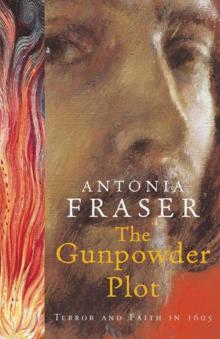 The Gunpowder Plot
The Gunpowder Plot Cromwell
Cromwell The Weaker Vessel: Women's Lot in Seventeenth-Century England
The Weaker Vessel: Women's Lot in Seventeenth-Century England Marie Antoinette: The Journey
Marie Antoinette: The Journey Oxford Blood
Oxford Blood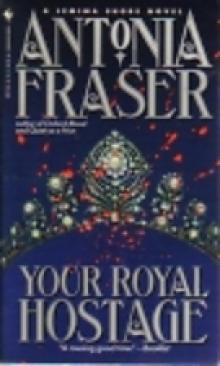 Your Royal Hostage
Your Royal Hostage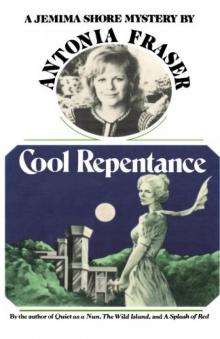 Cool Repentance
Cool Repentance Mary Queen of Scots
Mary Queen of Scots Political Death
Political Death Royal Charles: Charles II and the Restoration
Royal Charles: Charles II and the Restoration My History: A Memoir of Growing Up
My History: A Memoir of Growing Up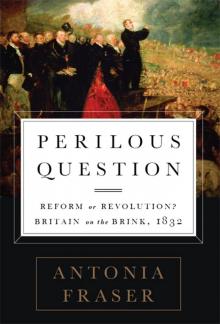 Perilous Question: Reform or Revolution? Britain on the Brink, 1832
Perilous Question: Reform or Revolution? Britain on the Brink, 1832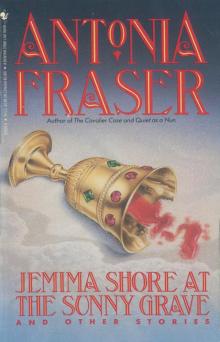 Jemima Shore at the Sunny Grave
Jemima Shore at the Sunny Grave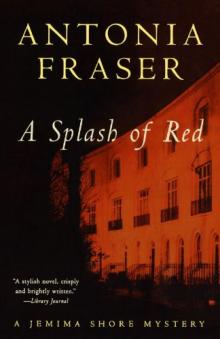 A Splash of Red
A Splash of Red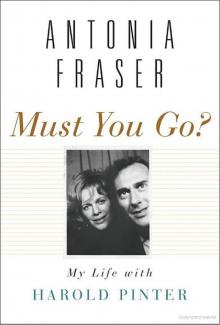 Must You Go?: My Life With Harold Pinter
Must You Go?: My Life With Harold Pinter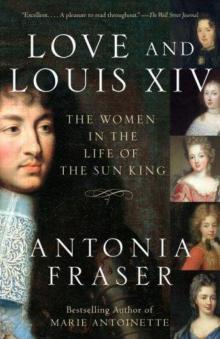 Love and Louis XIV: The Women in the Life of the Sun King
Love and Louis XIV: The Women in the Life of the Sun King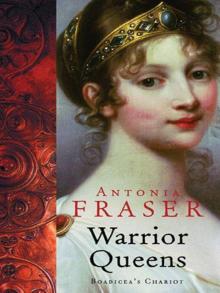 The Warrior Queens
The Warrior Queens The Wild Island
The Wild Island Quiet as a Nun
Quiet as a Nun Perilous Question
Perilous Question Cromwell, the Lord Protector
Cromwell, the Lord Protector Gunpowder Plots
Gunpowder Plots The Wild Island - Jemima Shore 02
The Wild Island - Jemima Shore 02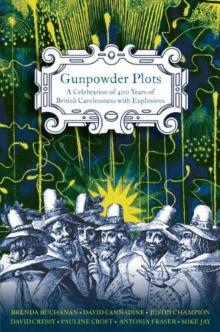 Gunpowder Plots: A Celebration of 400 Years of Bonfire Night
Gunpowder Plots: A Celebration of 400 Years of Bonfire Night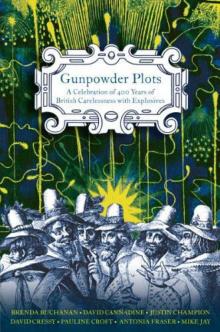 Gunpowder Plots_A Celebration of 400 Years of Bonfire Night
Gunpowder Plots_A Celebration of 400 Years of Bonfire Night Marie Antoinette
Marie Antoinette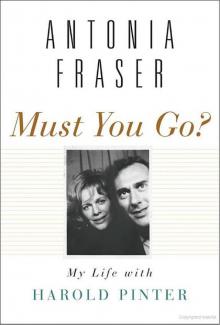 Must You Go?
Must You Go? My History
My History